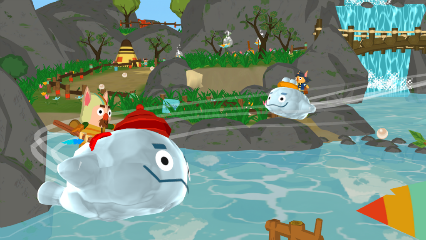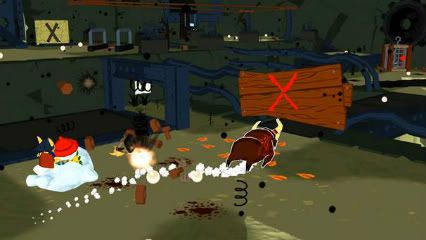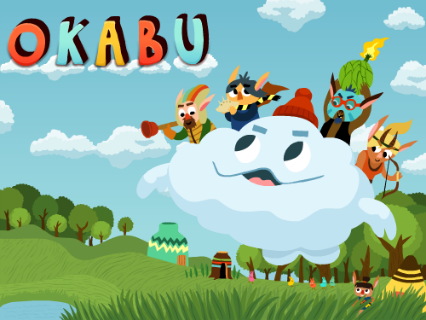- Format: PSN
- Unleashed: Out Now
- Publisher: Hand Circus
- Developer: Hand Circus
- Players: 1-2
- Site: http://www.handcircus.com/okabu/
PSN exclusive Okabu has been independently developed and self-published by five man team Hand Circus (the developer behind iPhone hit Rolando). The resulting game benefits from most of the creative advantages inherent in indie development; but also manages to stumble into a few pitfalls.
First the good, of which there is plenty. Okabu will likely enchant you within seconds. The rich, vibrant colours support the childlike art design, which manages to be unique and captivating without ever being messy or twee. The soundtrack deserves special mention; a vaguely tribal and highly atmospheric score which complements the four distinct environs perfectly. This is a game which grabs your attention immediately, and will find a pedestal in your memory much more easily than the legion of games which rely on greys, browns, and forgettable rock music.
Alone or with a friend, you take control of two ‘cloud whales’ who have left their home in the sky to find the source of the pollution seeping up from below. They find the peace and nature loving Yorubo people being harassed and kidnapped by the uber-industrialised Doza who serve as your robot-wielding, pollution spreading enemies. There are Yorubo tribespeople dotted throughout the game who make themselves available to you; but there are four recurring characters you’ll be concentrating on, each of whom affords you distinct abilities.
One allows you to make use of his harpoon plunger, primarily used to pull switches and move small objects. Another introduces the Charm ability, which in effect lays down a trail for villagers (used to open certain doors) and animals (used to clear paths or attack enemies) to follow. The third allows you to make use of certain Doza technology and, although this is used for puzzles like all other abilities, it also sometimes means the simple pleasure of whizzing around as a small robot shooting at things. The fourth and final Yorubo gives you the ability to take direct control of a creature who can fit into small gaps no other character can, and… move power cables around.
 The distribution and introduction of the various abilities and puzzle types are excellently done, avoiding the repetition and over-familiarity that could so easily have doomed the game. Things are mixed up further with the abilities the cloud whales have while without a Yorubo passenger; namely gathering and spitting a few types of projectile, and absorbing and spraying water or oil (mostly used for combat or creating fire trails respectively). Add to all this four inventive, optional minigames and some surprisingly demanding conditions to complete the game 100%, and you have a game with more depth than you might expect. Don’t be deceived by the first few levels, which don’t so much hold your hand as drag you along the road to victory. There are problems that simply can not be ignored, however.
The distribution and introduction of the various abilities and puzzle types are excellently done, avoiding the repetition and over-familiarity that could so easily have doomed the game. Things are mixed up further with the abilities the cloud whales have while without a Yorubo passenger; namely gathering and spitting a few types of projectile, and absorbing and spraying water or oil (mostly used for combat or creating fire trails respectively). Add to all this four inventive, optional minigames and some surprisingly demanding conditions to complete the game 100%, and you have a game with more depth than you might expect. Don’t be deceived by the first few levels, which don’t so much hold your hand as drag you along the road to victory. There are problems that simply can not be ignored, however.
It might seem mean spirited to point out the many spelling and grammatical errors in the text-only story, but this is indicative of a much wider problem. Sadly, the game is riddled with bugs. Some are minor, such as simple clipping issues. Others are less forgiveable. On two occasions, levels failed to load for us (once, we were returned to the XMB without warning). The game froze on us once, and characters became stuck on objects or scenery three times in the twenty main levels that we can remember.
Although basic movement is smooth and accurate, some other controls can prove to be rather fiddly (ruling out the young players a quick glance might suggest). Nowhere is this more apparent than with the vehicles, which unintentionally highlight everything the game does wrong all at once. Controlling Doza machinery involves the cloud whale (carrying the appropriate character) following closely behind, rather than sitting in the vehicle itself. You can only control the cloud whale or the vehicle; not both at the same time. It often feels more like you’re fighting the vehicle than controlling it; going forwards or backwards is fine, but turning in a small circle is a battle it’s unlikely you’ll ever perfect. This isn’t so much of an issue with the giant spiderbot, but the four wheeled machine used for carrying large objects is another story.
 While in the process of trying to work out how to make it turn when and where you want, there’s a depressingly high chance that it will tip backwards and/or become stuck in the scenery. Moving the aforementioned large objects means dealing with the unwisely included physics system which, while it may have seemed like a good idea at the time, only adds to the awkwardness and frustration of what are in theory very straightforward puzzles. The net result of all this is that you’ll be putting more effort than should be necessary into simply moving a vehicle around, sometimes while under attack from enemies. Just one hit knocks your passenger off, forcing you to travel back to a designated spawn point to pick them up again.
While in the process of trying to work out how to make it turn when and where you want, there’s a depressingly high chance that it will tip backwards and/or become stuck in the scenery. Moving the aforementioned large objects means dealing with the unwisely included physics system which, while it may have seemed like a good idea at the time, only adds to the awkwardness and frustration of what are in theory very straightforward puzzles. The net result of all this is that you’ll be putting more effort than should be necessary into simply moving a vehicle around, sometimes while under attack from enemies. Just one hit knocks your passenger off, forcing you to travel back to a designated spawn point to pick them up again.
These are ugly truths we wish did not need to be said. There are large chunks of the game where vehicles are not present, bugs are not present, and – best of all – where both are not present. When Okabu works it works really well, and is a refreshing joy to play. The sad truth is that the strain put on such a small team for such a large project has been transferred to the game itself, which is showing cracks. It’s not quite broken – and we’d like to stress that never did the problems outlined above cause us to give up playing before we otherwise would – but it’s not quite whole, either.


















Comments